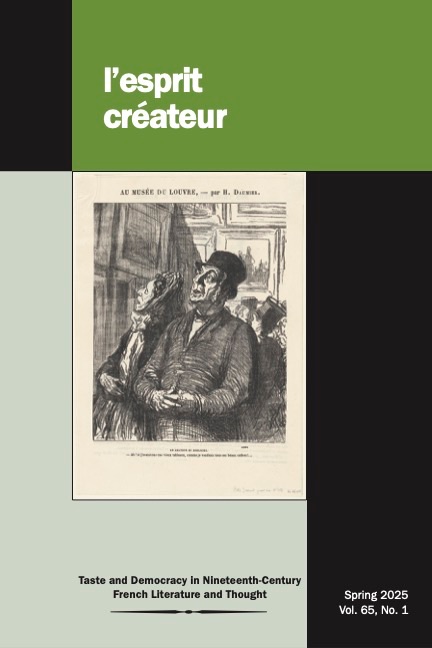
L'Esprit Créateur, vol. 65-1 : "Taste and Democracy in 19th Century French Literature and Thought" (dir. Patrick Bray, Alessandra Aloisi)
“Taste and Democracy in 19th Century French Literature and Thought”
Special Issue for L’Esprit Créateur
Guest Editors:
Patrick Bray (UCL) and Alessandra Aloisi (Oxford)
While the early-modern period in France was essential in forming the notion of taste as a category of knowledge, contemporary thought has followed Pierre Bourdieu’s sociological critique of taste as predominantly based on social positioning. With the rise of what has been called populism in the West, from Trump to the Gilets Jaunes and to Giorgia Meloni, there is now renewed interest in the category of taste, specifically bad taste, in political discourse that is seen by many as a threat to democracy. Conversely, there has been a perceived danger posed by disinformation campaigns run by political agents that prey on the supposed inability of the people, whose lack of knowledge and bad taste lead them to prefer propaganda to truth. This renewed discourse on taste echoes Romantic aesthetic thought from after the French revolution that linked together good taste, literature, and democracy, which was explored by such writers as Mme de Staël and Schiller. By the 1830s, however, taste had already begun to be discussed along sociological lines as aesthetics and politics were forcibly separated from polite discourse. The work of Jacques Rancière, specifically in his 2005 La Haine de la démocratie, has been particularly fruitful in showing how contemporary concerns about popular taste echo similar concerns in 19th-century France, as depicted in his ground-breaking book La Nuit des prolétaires. Books inspired by Rancière’s critique include William Marx’s 2015 La Haine de la littérature and Oliver Davis and Tim Dean’s 2022 book Hatred of Sex, which both show how a politicized taste has attempted to banish critical thinking and pleasure from acceptable discourse. Giorgio Agamben’s Gusto [Taste] provides a genealogy of taste that ties the founding of philosophy in ancient Greece to a sense of taste, which is to say a form of knowledge that combines pleasure and knowing while undoing identity categories. Agamben shows how these tensions run from Plato and Descartes to Nietzsche and Freud and form a “fracture that divides the subject”.
The essays for this volume explore how this “fracture” of the subject relates to political and aesthetic fractures throughout the nineteenth century in France, with a special focus on the period of the 1830s, when Balzac and Stendhal were contesting a Kantian formulation of taste. Other essays look at taste from a variety of perspectives, and explore the different meanings of taste, whether the aesthetic or the culinary, as the last few years has seen intense critical interest in food studies, particularly in 19th-century France.
'Taste and Democracy in Nineteenth-Century French Literature and Thought', Edited by Patrick Bray and Alessandra Aloisi. L'Esprit Créateur Vol 65, No 1, Spring 2025.
Taste and Democracy in Nineteenth-Century French Literature and Thought
Patrick Bray, Alessandra Aloisi
Encore un effort: Émancipation intellectuelle et esthétique chez Maine de Biran, Jacotot et Stendhal
Alessandra Aloisi
Stendhal, Balzac ou les ambivalences de l’argent niveleur
Francesco Spandri
Balzac and Kant: On Taste in the Democratic Age
Scott Sprenger
“Se fouler la rate pour si peu”: Baudelaire’s génie and the (De)Formation of Taste in the 1846 and 1859 Salons
Victoria Pesci-Feltri Zurita
A Matter of Taste: The Political Catastrophe of 1848 in Flaubert’s L’éducation sentimentale as an Aesthetic Fiasco
Vesna Elez
Contre le trivialisme : Art et démocratie dans la philosophie de la vie de Jean-Marie Guyau
Annamaria Contini
French Tongues in the Caucasus: An Exercise in Taste and Translation
Janet Beizer
Eccentric Pleasure as Power: The Taste of the Colonies in Rachilde’s La jongleuse
Adeline Soldin
Perfume on the Page in Nineteenth-Century France by Cheryl Krueger (review)
Susan Hiner
The Harlequin Eaters: From Food Scraps to Modernism in Nineteenth-Century France by Janet Beizer (review)
Sima Godfrey
The Sun King at Sea: Maritime Art and Galley Slavery in Louis XIV’s France by Meredith Martin and Gillian Weiss (review)
Marcus Keller
Dysphoric Modernism: Undoing Gender in French Literature by Mat Fournier (review)
Maxime Foerster.